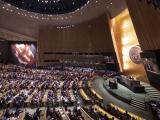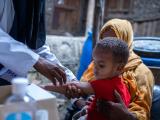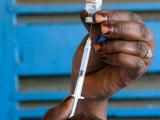Jan 13, 2010 (CIDRAP News) – Leading public health officials and experts have sharply rejected charges from some European officials that pharmaceutical companies used exaggerated claims about the H1N1 pandemic threat to scare governments into buying unnecessary stockpiles of vaccines.
The Council of Europe, an organization of 47 nations, said yesterday that the charges will be on the agenda when its Parliamentary Assembly meets in Strasbourg, France, later this month. The assembly's Social Affairs Committee has asked for a debate on the theme "False pandemics: a threat to health," according to a statement on the council's Web site.
The charges, detailed in a proposed resolution, come as the United Kingdom, France, Germany, and other countries are scaling back their vaccine orders. Weak demand for the vaccine in the face of declining flu activity and the need for just one dose have left many countries with surpluses, though public health officials warn that another wave of infections could come this winter.
Dr Wolfgang Wodarg, a German physician and politician who chairs the Council of Europe's health committee, was quoted in the British media as saying the World Health Organization's (WHO's) pandemic declaration last June triggered vaccine contracts with governments and that companies reap financial benefits without taking any risks. He told the London Daily Mail that the pandemic H1N1 virus was "a mild flu and a false pandemic."
In the Council of Europe resolution, Wodarg and 13 others charge that pharmaceutical companies have made countries "squander tight health care resources for inefficient vaccine strategies and needlessly exposed millions of healthy people to the risk of unknown side-effects of insufficiently tested vaccines." The group asked the council to investigate the claims.
The WHO has said it would review its pandemic response after the pandemic is over and would field questions related to the proposed Council of Europe resolution at its executive board meeting on Jan 18, according to media reports.
European officials dismiss charges
The proposal has drawn quick and sharp responses from top public health officials. Dr David Salisbury, head of the United Kingdom's immunization program, told the London-based Guardian newspaper that though England is in discussions about what to do with its pandemic vaccine surplus, the government must keep a stockpile in case another wave of infections occurs. "If there were a UK resurgence during 2010, we would look very foolish if we had disposed of a valuable stockpile," he told the paper.
In a House of Commons session yesterday, British Health Secretary Andy Burnham faced similar criticism from other lawmakers and defended the government's pandemic preparedness actions, the Press Association reported. "I would make no apology for making all the necessary preparations to keep the public safe through that. I think we have come through the pandemic because of the strength of the plans and the preparations that this Government put in place," he said.
Also yesterday, Australia's chief medical officer, Dr Jim Bishop, called Wodarg's claims "historically and medically inaccurate," according to NewsCore, an Australian news service. He said the WHO's pandemic declaration was based on cases and deaths in Mexico and the United States and not on pharmaceutical company influence. He also disputed Wodarg's claims that the vaccine was rushed, asserting that Australia's Therapeutic Goods Administration thoroughly assessed the pandemic vaccine.
US experts react
Dr Gregory Poland, MD, director of the Mayo Clinic's Vaccine Research Group in Rochester, Minn., told CIDRAP News that though he has no knowledge of interactions drug companies might have had with governments in Europe, Wodarg's claims are "preposterous."
"The idea that pharmaceutical companies made official agencies squander their resources is ludicrous," he said.
"Vaccine stockpiles are like insurance policies," he said. "You're talking about the health and welfare of entire nations."
However, Poland said he's not surprised by the criticism. Poland said those involved in pandemic planning expect that no matter what they do, some groups will criticize their actions. "Authorities are obligated to prepare for the worst and hope for the best," he said.
Global health officials know that one small mutation in the virus could have turned a relatively mild first pandemic wave into a much more lethal second wave, Poland said, calling the notion that governments have wasted their preparedness resources an unfair criticism. Wodarg's comments "imply a profound lack of insight into public health emergency planning," he said.
Poland said world governments guarantee purchases of pandemic vaccine as a public service that supports flu vaccine production, which is generally not profitable for manufacturers.
A similar backlash if the United States has a big surplus is unlikely, because events like Hurricane Katrina have caused Americans to expect their government to be prepared, he said. Though pockets of antivaccine sentiment exist in the United States, negative perceptions about vaccines might be greater in Europe because of often sensationalized media reports about now-disproven claims of a link between the measles, mumps, and rubella (MMR) vaccine and autism, Poland said
Poland also rejected claims that the WHO was unduly influenced by pharmaceutical companies in declaring a pandemic. He said the WHO takes steps to prevent groups from influencing policy decisions and consults with a pharmaceutical company consortium on manufacturing issues, but not on scientific matters related to the virus and illness.
Criticisms called irresponsible
Another US infectious disease expert, Michael T. Osterholm, PhD, MPH, called the claims of a pharmaceutical industry conspiracy irresponsible and said a third wave of H1N1 cases could quickly soak up any vaccine surpluses.
"It's absolutely irresponsible and plain nonsense," said Osterholm, director of the University of Minnesota's Center for Infectious Disease Research and Policy, publisher of CIDRAP News.
"Unfortunately, it's very easy to make charges like this, which not only undermine the overall ability to respond in the future, but also give the public the sense that public health intentionally exaggerates these potential situations for resources," he said.
"I worry that if these companies end up taking a major economic hit or are brought before a court of public opinion that they'd have every reason to be reluctant in the future to put resources forward for a pandemic vaccine," Osterholm added.
He likened the criticisms to complaining after a category 3 hurricane about having spent the money to build levees for a category 5 event. "I'd much rather be in that position than the other way around," he said.
"We've not written the final obit on this pandemic yet," Osterholm added. "I think many of these officials [who are criticizing the response now] would be questioned if we had a severe third wave. I guarantee that if we have a severe third wave, there won't be a drop of vaccine left."
Another US disease expert, Walter R. Dowdle, MD, a former deputy director of the Centers for Disease Control and Prevention (CDC), declined to comment on the European response to the pandemic, but voiced strong support for the US response. The American approach has generally paralleled that of Western European countries.
"I feel the US did a highly credible job in making early vaccine production and purchasing decisions, assessing and reassessing needs, adjusting high risk definitions, and modifying vaccine recommendations, all as knowledge of the novel H1N1 continued to emerge," said Dowdle, who is director of the Malarone Donation Program and a consultant to the World Health Organization on its polio eradication initiative.
"The fact that the 2009 H1N1 vaccine began to arrive as virus transmission began to decline, as in 1957 and 1968, speaks to the shortcomings of outmoded pandemic vaccine production methodology, not the public health decision making process, he said.
On Dec 3 the WHO issued a statement in response to concerns aired in the media about its advisory body's ties to pharmaceutical industry experts. It said its ties to the companies have many legitimate reasons, including improving global access to medications, vaccines, and diagnostic supplies, all of which can mitigate the impact of a pandemic.
The agency said numerous safeguards are in place to prevent conflicts of interest. For example, the WHO said external experts who advise the WHO are required to declare financial interests that could influence their advice. It added that procedures are in place for identifying and investigating potential conflicts of interest.
The WHO added that the criticisms are understandable but unfounded. It said public perceptions have been influenced by previous planning for a more lethal H5N1 pandemic threat. "Adjusting public perceptions to suit a far less lethal virus has been problematic," the agency said. "Given the discrepancy between what was expected and what has happened, a search for ulterior motives on the part of WHO and its scientific advisers is understandable, though without justification."
See also:
Proposed Council of Europe resolution
Dec 3 WHO statement on advisory bodies in responding to the influenza pandemic
http://www.who.int/csr/disease/swineflu/notes/briefing_20091203/en/index.html.
Information about upcoming Council of Europe Parliamentary Assembly meeting
















